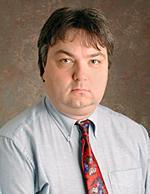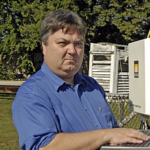David Legates, Ph.D., is a climatologist at the University of Delaware. He served as Delaware State Climatologist from 2005 to 2011. Legates has published more than 125 articles in refereed scientific journals, conference proceedings, and monograph series. Environment & Climate News Managing Editor H. Sterling Burnett interviewed Legates, who was honored at the Tenth International Conference on Climate Change in June 2015.
Burnett: You were the state climatologist for Delaware, but no longer are. What cost you this position?
Legates: Following the firing of state climatologists in Oregon and Virginia and the associate state climatologist in Washington, the Wilmington (DE) NewsJournal suggested the governor fire me because my views were not in line with hers. As a response, Gov. Ruth Ann Minner (D) wrote a polite letter explaining “recent media coverage of events … has generated some confusion about the role of the State Climatologist” and asserting that “I understand that you have not provided your opinions as [though you’re representing the governor’s office].”
The NewsJournal then ran a story stating the governor had forbidden me from using the title “state climatologist” when discussing climate-related issues. Gov. Minner left office in 2009, and I remained as the state climatologist.
Late in 2009, Greenpeace filed a [Freedom of Information Act] request for my records as the state climatologist. The University of Delaware subsequently expanded that request to include my activities as university faculty while simultaneously rejecting similar [Freedom of Information Act] requests on others at the university. So I secured the services of a lawyer, which prompted the dean of my college to state that “this college will no longer support anything you do.” Consequently, she asked for my resignation as state climatologist, and I was removed from the position.
As the office has since become a supporter of climate change advocacy in Delaware, my firing appears [to have been] politically motivated.
Burnett: Please tell us about your recent paper, “Why Models Run Hot: Results from an Irreducibly Simple Climate Model.” What did you and your coauthors discover, and what has been the response?
Legates: The goal of this paper was to evaluate the climate feedbacks associated with carbon dioxide. If there were no feedbacks, the effect of a doubling of carbon dioxide would result in a warming of about 1° C. Climate models suggest the warming should be between 2.5° and 4.5°, implying a high degree of positive feedback. Using a simple climate model to allow investigation of complex feedbacks, we found complex climate models grossly overstate the effect of feedbacks—the feedbacks may indeed be negative. Moreover, the claim that unrealized warming resides “in the pipeline” is really only a cover to explain why their models overstate observed warming. Our results show there is no warming waiting to occur.
The response has been predictable. [The paper] has been criticized by the usual suspects—some who openly admitted they had not read our paper. The big criticism has been that the model is too simple, but that was precisely the point: Climate models have become so complex that diagnosing errors in them is nearly impossible.
Our research further suggests model prognostications of disastrous climate change are greatly exaggerated.
Burnett: Degrees of skepticism exist regarding the theory humans are responsible for climate change and its impacts on human health and ecosystems. Some don’t believe humans are playing any role in current climate conditions, others think we have had a modest impact, and still others think humans are affecting climate but it’s not likely to have a dangerous impact (and possibly even a beneficial one). Where do you fall on the spectrum, and why?
Legates: Unfortunately, the press plays the CNN Crossfire game. There are two views, and they are the polar extremes. First, climate change is real, because climate always has changed. It is not simply “average weather” but is dynamic and variable. Second, humans can and do influence Earth’s climate. We see that with the urban heat island effect, for example. Third, [carbon dioxide] and other trace gases have increased largely from human activity. Fourth, air temperature has risen globally over the past century.
Aside from these facts, the issue has been the sensitivity of climate to changes in these trace gases. My view is the models have overstated their importance, and CO2 is only a minor player in global climate change; the Sun plays a dominant role. Flooding, for example, has increased largely from changes in land cover (e.g., more impervious surfaces) than changes in precipitation. I continue to assert that a well-informed and prudent response is always the only course of action.
Burnett: What have you found to be the most disturbing aspect of the way climate research and climate policy have developed in recent years?
Legates: There are several disturbing aspects. Money has driven the charge to document global warming, and there is far more money and fame to be had by saying the sky is falling. With that have come decidedly nasty attacks by activists and scientists alike whose goal is to destroy reputations and careers by silencing dissent.
Compounding these aspects is that public policy and ideology are driven by this debate; it is not simply an academic disagreement that has no larger implications. Indeed, President Eisenhower was correct when he stated that public policy could “become the captive of a scientific-technological elite.” His fears have become realized.
H. Sterling Burnett, Ph.D. ([email protected]) is a research fellow with The Heartland Institute.






